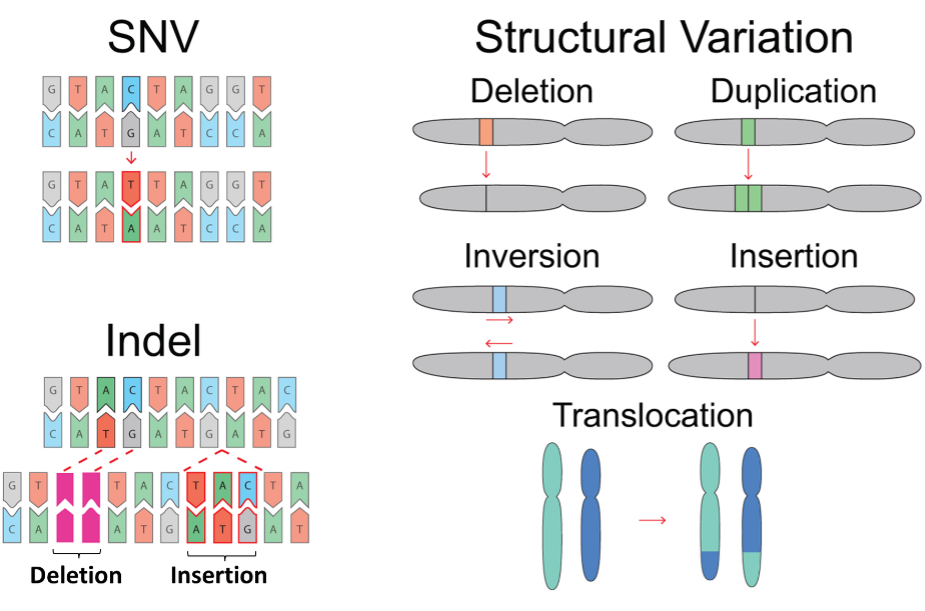Understanding Mutations in Cancer
Cancer is a complex and multifactorial disease characterized by uncontrolled cell growth and division, often caused by mutations in genes that are critical in regulating normal cellular processes such as cell growth, division, death and DNA repair. Based on their role in cancer development and progression, mutations can either be driver mutations or passenger mutations. Driver mutations are molecular alterations that provide selective growth advantage in cancer cells, allowing them to grow and divide uncontrollably. These mutations can activate oncogenes or inactivate tumor suppressor genes to drive the formation and progression of cancers, making them attractive targets of cancer therapies. On the other hand, while passenger mutations are more common in tumors, they do not confer selective growth advantage or drive tumorigenesis. Hence, they are not typically targeted in cancer therapies, although they may still provide information about the cancer. Mutations in cancer can be categorized into three classes according to the size of the mutations.
- Single Nucleotide Variants (SNVs)
- Insertion and deletions (InDels)
- Structural variants
Single Nucleotide Variants (SNVs)
SNVs consist of a substitution of a single nucleotide for another in the DNA sequence, which is made up of four nucleotides: adenine, guanine, thymine and cytosine. The prevalence of SNVs can vary in different populations, and if the variant is present in at least 1% of the population, it is then known as single nucleotide polymorphism (SNP). SNVs that occur in the protein coding region can be classified into three categories based on its effect on the protein: silent mutation (SNV does not change the amino acid sequence, though it may still affect protein’s function), missense mutation (SNV changes the amino acid sequence, potentially altering protein’s function) or nonsense mutation (SNV introduces premature stop codon, resulting in truncated and usually non-functional protein).
Insertion and deletions (InDels)
An InDel refer to a short length of DNA (less than 50 base pairs) that has been inserted into or deleted from the genome. Each group of three bases in mRNA constitutes a codon, and each codon corresponds to a particular amino acid during translation. Hence, if the insertion or deletion is not in a multiple of three, it can result in frameshift mutation, which alters the reading frame of the remaining bases and lead to non-functional protein or protein with altered function.
Structural variants
A structural variant is a large rearrangement of the genome (50 base pairs or more), which can be due to insertion, deletion, inversion (a segment of DNA breaks off and reattaches in reverse orientation within the same chromosome), translocation (a segment of DNA from one chromosome breaks off and reattaches to another chromosome, leading to fusion genes) or duplication (repetitions of a segment of DNA). Copy Number Variation (CNV) is also a type of structural variant and refers to changes in the number of copies of a particular gene. CNVs can result in gene amplifications (an increase in the number of copies of the gene) or gene deletions (loss of copies of the gene).
Detecting structural variants in cancer is more challenging than smaller mutations like SNVs or InDels due to the involvement of larger segments of DNA and the complexity of the mutations. Furthermore, multiple mutations often accumulate over time to drive cancer initiation and progression. Next-generation sequencing (NGS) is a powerful tool that can assess hundreds of different mutations, from small nucleotide changes to large structural variations, at high resolution in a single assay. Thus, NGS is now an important component of precision medicine, which can be used to guide treatment decisions, monitor treatment response, track resistance mutations and detect minimal residual disease.

Figure: Types of mutations in cancer (figure modified from Nesta et al., Trends Genet. 2021;37(8):717-729).
Canary Oncoceutics has a steadfast commitment to three fundamental pillars: advancing scientific knowledge, fostering collaboration, and ultimately, enhancing the lives of cancer patients worldwide. From cutting-edge research to impactful clinical advancements, Canary Oncoceutics aims to illuminate the transformative potential of tailored cancer treatments. Join us on this journey towards a future where every cancer patient receives personalized, effective treatment tailored to their unique needs._
To know more, connect with us on LinkedIn, Facebook, Twitter, Instagram, and our YouTube Channel